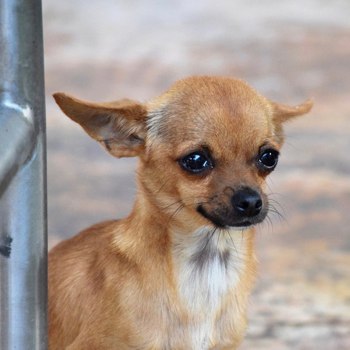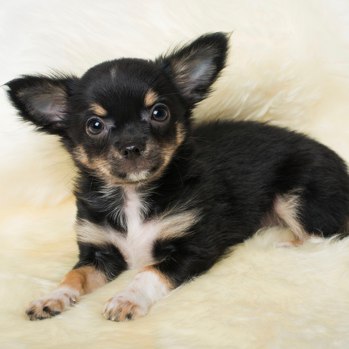Chihuahua

Although it is the smallest breed of dog in the world, the Chihuahua has a big personality. These little dogs are loyal, intelligent and courageous. The breed is thought to originate from wild dogs which were domesticated by the Toltecs and then rose to popularity in Mexico and later America where they were further refined. Today they are a popular companion dog, favoured for their charming but bold characters and small size. The Chihuahua comes in numerous different colours and can be either smooth or longhaired and has an easy to maintain coat, which can be kept in order by brushing.
Chihuahuas are quick to learn and usually keen to please their owners so training and recall is not normally a problem. They are not suitable for families with small children as they can be snappy and possessive and their size means they are delicate. They do, however, enjoy company and do not like being left alone. Chihuahuas are small dogs that do not require much exercise but should still be provided with plenty of mental stimulation. Despite their small size they can suffer from some health problems so choosing a breeder which tests for these is important.
About & History
The Chihuahua is the smallest dog breed in the world. There is some uncertainty about its roots but it is thought to have originated from wild dogs domesticated by the Toltec civilisation. These early ancestors were called Techichi and are depicted on pottery found from as far back as 300 BC. The modern Chihuahua became popular in Mexico towards the end of the 1800s and was named after the state where it first became well known. The breed was further refined in the American state of Texas and is now a popular companion dog around the world.
More recently, the Chihuahua has seen an enormous rise in its popularity, partly due to the fact that several famous figures have them as pets, which has raised awareness of the breed. Other than as companions, Chihuahuas do not have any other uses.
Appearance

The UK Kennel Club accepts registration of a large variety of colours for the breed. Accepted colours are the same for smooth and long haired Chihuahuas:
- Black
- Black & Tan
- Black & White
- Black Particolour
- Blue
- Blue & Tan
- Blue & White
- Blue Fawn
- Blue Fawn & White
- Blue Fawn Sable
- Blue Sable
- Blue Sable & White
- Chocolate
- Chocolate & Gold
- Chocolate & Tan
- Chocolate Tan & White
- Cream
- Cream & White
- Cream Sable
- Dark Sable
- Fawn
- Fawn & White
- Fawn Sable
- Gold
- Gold & White
- Gold Sable
- Red
- Red & White
- Red Sable
- Red Sable & White
- Sable
- Sable & White
- Tricolour
- White
- White & Chocolate
- Wolf Sable
The Chihuahua can come in smooth and long coated varieties which may or may not have an undercoat but the breed standard is exactly the same for both. Merle colouring is not ever accepted for registration with the Kennel Club as it can be linked to health problems. Their size is judged only by weight, not height and they should weigh between 1.8 and 2.7 kg.
The Chihuahua should have a medium length neck which is slightly arched, and this should be broader in male dogs. Long coated Chihuahuas may have a neck ruff. Their neck should lead to and blend into shoulders, which are laid back and angled ensuring that the front legs are positioned well under the body. The ribcage should be deep and reach the level of the elbows and then tuck up towards the abdomen. The topline should be level and the body should be slightly longer than the height at the withers. Hindquarters should be muscular and both front and back legs should be straight. The tail should be of a medium length and high set, tapering to a point.
The breed has an ‘apple dome’ skull, which is rounded and proportionately large, with a relatively short muzzle that is just a little pointed. They should have a perfect scissor bite and a complete set of teeth. Nose colour can change depending on coat colour. Eyes are wideset, large and rounded but should not protrude excessively; their colour can also change depending on coat colour. Chihuahuas have large ears for their size with slightly rounded points, which are set at an angle and stand up straight.
Chihuahuas should move with an active and springy gait which is driven by the back legs and has good reach despite their small size. When seen from the front or back, legs should not be too wide apart or close together and move parallel to the body, maintaining the topline flat even while moving. A hackney or high stepping gait is considered undesirable.
Character & Temperament
The Chihuahua is a small dog with a big character. They are alert, spirited and intelligent little dogs that are cheeky and very quick to learn but also have an independent character. They can be cautious in new situations and like to weigh things and are often prone to barking and being noisy. They also pick up acutely on their owner’s character and respond accordingly if they notice them being stressed or tense. Different family lines of Chihuahua can vary significantly in the type of character that they have, so it is important to meet the parents of a litter if you are considering getting a puppy.
They are not appropriate for small children, as they can be snappy. Older children should be taught to be calm and respectful around them, as they will not tolerate prodding and poking. Their big character means they do not always get on that well with other dogs and animals, so socialisation from a young age is important to try and avoid problems. Chihuahuas tend to be extremely loyal and form strong bonds with their owner or family and often do not like being left alone. Their small size means they are not typically used as guard dogs but their noisy nature can mean they will raise the alarm.
Trainability

Chihuahua are intelligent and highly trainable. They learn quickly and generally aim to please their owner. They can be strong-minded and independent so it is important to try and teach them good habits from a young age.
House training is not usually an issue, especially if puppies become used to a routine and are allowed access to an outside space on a regular basis. Chihuahuas trainable nature and loyalty means that training good recall is not normally a problem.
Health
Chihuahuas are a long lived breed and have an average lifespan stated as 12+ years by the UK Kennel Club, however, they can frequently live significantly longer, to 15+ years old. At the time of writing, there are not any tests that are obligatory for UK Kennel Club Assured breeders relevant to the breed, however, there are still some health problems which can affect the Chihuahua. These include:
Patellar Luxation
This condition is when the equivalent to the knee cap in the back leg slips out of place. It can be painful and cause stiffness and make walking and running uncomfortable. Depending on the severity it can be treated with surgery. Patellar luxation appears to be becoming more prevalent in the Chihuahua population so choosing a health family line is important.
Merle Colouring
The gene responsible for Merle colouring has some serious health problems associated with it and no responsible breeder should be deliberately breeding Chihuahuas for this colouring. These problems affect the eyes and ears and can ultimately lead to blindness and deafness.
Hydrocephalus
This is when fluid builds up around the brain and often causes an overly domed head. The build-up of fluid causes an increase in pressure, which can cause brain damage and eventually death but symptoms depend on its severity.
Legg Calvé Perthes Disease
A disease which causes degeneration of the head of the femur where it articulates with the hip in the back leg. This is painful and eventually causes arthritis. It is thought the condition is caused by problems with the blood supply to the bone. Treatment is based around reducing pain, and surgery may be needed.
Tracheal Collapse
A condition which is common in small dogs as the rings of cartilage which usually hold the trachea open are fragile and prone to collapse. It is important to avoid any pressure on the neck area and always use a harness as opposed to a collar.
Corneal Ulcers
Chihuahuas have protruding eyes which mean they can be prone to getting bumped or scratched. These types of injuries can lead to the formation of ulcers which can be very painful and if not treated correctly or repeated eventually lead to blindness.
Teeth Problems
Chihuahuas have small mouths which mean they can be more prone to teeth problems than some other breeds. They may have too many teeth and are also prone to gum disease and losing teeth. Regular dental check-ups with a vet to help identify any problems and brushing from a young age may help reduce the chances of tooth decay and loss and gum disease occurring at a very early age.
Hypoglycaemia
Hypoglycaemia occurs when blood sugar levels become too low. This is not uncommon in small breeds, especially when they are young as they can use more calories than they are able to consume. If allowed to progress hypoglycaemia can lead to loss of coordination, glazed eyes, seizures and eventually death.
If a dog does become hypoglycaemic it should be given glucose directly in the mouth as fast as possible. However, avoiding the condition in the first place means regular feeding of small meals several times a day and avoiding sugary snacks.
Molera
It is not unusual for Chihuahuas to be born with an opening in their skull before the bones fuse, known as a molera. This can be perceived externally as a ‘soft’ patch on the top of their head and should gradually close, however, care should be taken when dogs are young so they do not unintentionally damage themselves.
Weight Gain
Chihuahuas are so small that it is easy to over feed them. Being overweight can exacerbate other problems such as tracheal collapse. Since the Chihuahua has such a small frame it does not take much extra weight to start to cause problems, such as diabetes and putting stress on the joints, so an appropriate diet and exercise is very important.
Exercise and Activity Levels
Despite their small size, Chihuahuas are lively dogs which enjoy playing and need plenty of mental stimulation. They are usually kept happy and healthy with around 45 minutes of walking a day and off lead time is not essential but they should have plenty of toys to keep them busy at home.
Although Chihuahuas are not normally intimidated easily, they usually prefer to play with smaller dogs, as larger dogs, even though it may unintentional, can easily damage them. Their minimal exercise needs and small size means they are ideal city dogs and can happily live in small apartments.
Grooming
All Chihuahuas have a soft coat but the amount of grooming that a Chihuahua requires depends on the type of coat it has. Smooth coated Chihuahuas require barely any grooming at all and only very occasional brushing to remove and hair, which is shed, is sufficient. Long coated Chihuahuas require more regular brushing but do not necessarily need to be taken to a specialist groomer. Brushing at home should be enough to stop the coat from becoming matted and minimize shedding around the house.
The Chihuahua's small size can mean they are prone to feeling cold, especially the smooth coated variety. In cold climates or winter they need plenty of warm bedding or a coat to keep them warm. They enjoy basking in the sun when it is out to keep warm. Some dogs may suffer from tear staining around their eyes, and need the area below their eyes cleaning regularly.
Some Chihuahuas can be prone to a condition called 'Pattern Baldness', otherwise known as Canine Non-Inflammatory Alopecia. This is when they lose their hair and become bald in very specific areas, such as around the ears and on the thighs. The condition is an aesthetic one and does not cause discomfort or require any treatment, but Chihuahuas which suffer from it, may need extra help to keep warm.
Famous Chihuahuas
Chihuahuas appear in numerous films and series and are popular dogs amongst the famous. Some well-known Chihuahuas are:
- Chloe and Papi from the film, Beverly Hills Chihuahua
- Bruiser from the films Legally Blonde 1 and 2
- Ren Hoek from the cartoon series, The Ren and Stimpy Show
- Mammoth Mutt from animated series, Krypto the Superdog
- The Chihuahua from the cartoon series, Phineas and Ferb
- Tito from the feature animation, Oliver and Company
- Pedro from the film, Lady and the Tramp
- Coco from the teen sitcom, That’s So Raven
- Madeleine Shirley from the cartoon series, Courage the Cowardly Dog
Cross-Breeds
There are many popular Chihuahua cross-breeds, some of examples of them are:
- Cheagle – Cross between a Chihuahua and a Beagle
- Affenhuahua – Cross between a Chihuahua and an Affenpinscher
- Chion – Cross between a Chihuahua and a Papillon
- Chi-Chon – Cross between a Chihuahua and a Bichon Frise
- Boston Huahua – Cross between a Chihuahua and a Boston Terrier
- Toxirn – Cross between a Chihuahua and a Cairn Terrier
- Chi Chi – Cross between a Chihuahua and a Chinese Crested Dog
- Chigi – Cross between a Chihuahua and a Corgi
- Chilier – Cross between a Chihuahua and a Cavalier King Charles Spaniel
- Chi-Spaniel – Cross between a Chihuahua and a Cocker Spaniel
- Chiweenie – Cross between a Chihuahua and a Dachshund
- French Bullhuahua – Cross between a Chihuahua and a French Bulldog
- Italian Greyhuahua – Cross between a Chihuahua and an Italian Greyhound
- Jack Chi – Cross between a Chihuahua and a Jack Russell Terrier
- Chizer – Cross between a Chihuahua and a Miniature Schnauzer
- Chatterdale – Cross between a Chihuahua and a Patterdale Terrier
- Pomchi – Cross between a Chihuahua and a Pomeranian
- Chi-Poo – Cross between a Chihuahua and a Poodle
- Chug – Cross between a Chihuahua and a Pug
- Chestie – Cross between a Chihuahua and a West Highland White Terrier
- Chorkie – Cross between a Chihuahua and a Yorkshire Terrier
- Malchi – Cross between a Chihuahua and a Maltese
- Pomapoochi – Cross between a Chihuahua, a Pomeranian and a Poodle
- Cheke-A-Pom – Cross between a Chihuahua, a Pomeranian and a Pekingese

